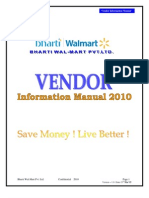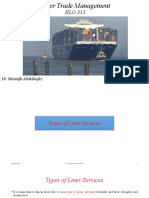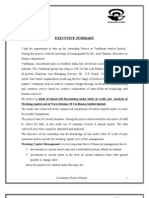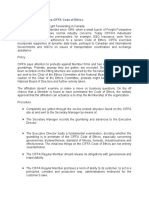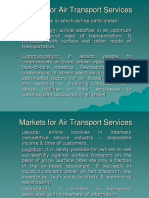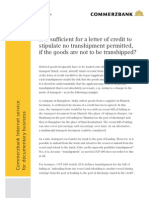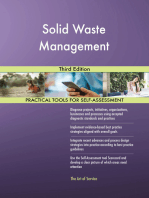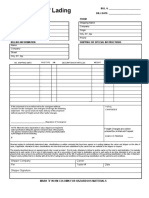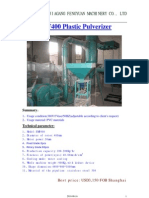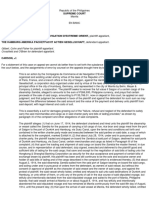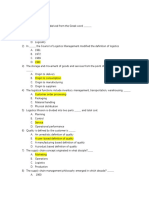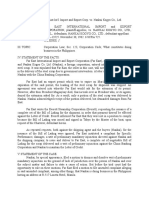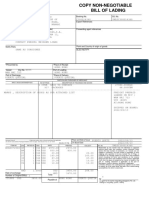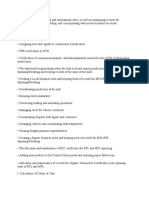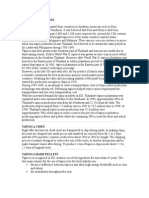Importance of Proforma Invoice
Importance of Proforma Invoice
Uploaded by
Shalish KumarCopyright:
Available Formats
Importance of Proforma Invoice
Importance of Proforma Invoice
Uploaded by
Shalish KumarOriginal Description:
Copyright
Available Formats
Share this document
Did you find this document useful?
Is this content inappropriate?
Copyright:
Available Formats
Importance of Proforma Invoice
Importance of Proforma Invoice
Uploaded by
Shalish KumarCopyright:
Available Formats
2nd Floor, B-166, Shrenikpark, Opp. Akota Stadium, Productivity Road, Vadodara-390020[ Guj.] India.
Telefax: +91 265 2342145/9824067098/9925292092 Email: wtcindia@gmail.com Website: www.worldtradeconnections.co.in
Importance of Proforma Invoice
Often when potential importers are duly satisfied with the product, quality, sample sent for approval or lab analysis, packing, delivery schedule and prices acceptable. They request for a firm offer from the exporters.
What do most exporters provide their prospective buyers? Offer quotation indicating price, quantity and cost of transportation? Other terms like, Mode of payment, product availability, shipping instructions and service charges? Terms of sale, description and delivery time? Yes, but this is not enough information for importers to make a buying decision. To make life easier for buyers, exporters should always quote using a carefully prepared Performa invoice. It is a common for most exporters to provide their buyers with limited information when asked for a quotation. This lack of details and accurate information by exporters is probably a major factor why products with good quality and competitive prices do not get sold.
Whether you are the exporter or the importer, it is quite critical that you understand how successful exporters quote buyers using pro forma invoice. You should be able to clearly distinguish the differences between quotation, Performa invoice and commercial invoice. The following brief descriptions are intended to help you understand their differences and to provide you with all the items that you should include in a Performa invoice plus the areas that you have to consider when completing a commercial invoice.
2nd Floor, B-166, Shrenikpark, Opp. Akota Stadium, Productivity Road, Vadodara-390020[ Guj.] India. Telefax: +91 265 2342145/9824067098/9925292092 Email: wtcindia@gmail.com Website: www.worldtradeconnections.co.in
Quotations
A worksheet for calculating export costs to sell goods or services at a stated price and under specific conditions, the quotation is generally presented to the buyer in a formal way using a Performa invoice. A quotation may include all the contents that appear in a typical pro forma invoice except:(1)Country of origin of product and (2) the title Performa invoice.
Performa Invoice
A price quotation prepared in the form of an invoice, a Performa invoice, is different from commercial invoices. It is used to create a sale and is sent in advance of the commercial invoice. The content of a Performa invoice is almost identical to a commercial invoice and is usually considered a binding agreement although the price might change in advance of the final sale. For establishment of LC or for advance payment by the importer through his bank, usually banks prefer Performa invoice to a quotation. In some countries, the US for example, Customs may accept a Performa invoice (generated by the US importer and not the exporter) if the required commercial invoice is not available at the time when filing entry documents (entry - the process of filing documents with US Customs at the port of entry to get goods released from Customs). U.S. Customs may use a pro forma invoice to assess duty and examine goods. The importer on record however, is required to post a bond and produce a commercial invoice within 120 days from the date of entry. If the required commercial invoice is needed for statistical purposes the importer has to produce the commercial invoice within 50 days from the date Customs releases the goods to the importer. Here are some reasons why pro forma invoices are widely used in international transactions: Considered as a binding agreement between exporter and importer. May be required by some countries as part of their import licensing procedures. Bankers and financial institutions use pro forma invoices to open letters of credit, advance payments, etc., for importers.
2nd Floor, B-166, Shrenikpark, Opp. Akota Stadium, Productivity Road, Vadodara-390020[ Guj.] India. Telefax: +91 265 2342145/9824067098/9925292092 Email: wtcindia@gmail.com Website: www.worldtradeconnections.co.in
Easily recognized due to their similarity to commercial invoices. Pro forma invoice format encourages exporters to include all the information that shall appear in the commercial invoice. Keep the following points in mind when your company is asked to produce a proforma invoice: The title of the document should clearly say "Pro Forma Invoice". Exporter's name, address, telephone number and e-mail address. Sold to name, address, telephone number and e-mail address. Pro forma invoice reference number. Date issued. The date of the pro forma invoice is the date of the quotation. Customers Inquiry reference number or purchase order number, if available. Terms of payment (letter of credit, documentary collection, pre-payment, T/T, open account etc.). Exporters banking details for advising /negotiating LC or SWIFT code details for Wire Transfer. Estimated date of shipment. If more than one product, number each product beginning with number 1. Type of Delivery & shipment : Full in one lot or partial. Indicate Transshipment if any, Quantity shipped per lot. Full product description, include the Harmonized Schedule (HS) code if available. Indicate clearly currency used (USD, Euro, Yen etc.). Unit pricing should be included. Unit pricing should be extended by the quantities quoted to form the line item total. Any additional supplies-provided services should be itemized and should be added to reach a grand total. Terms of sale using latest INCOTERMS (FOB, CIF, CFR, DDU etc.- named port or destination). Identify the number of unit measure, weight, case, pallets, box, etc., The country of origin of the product. Cost of any additional documents, inspection, legalization, etc., to be borne by the importer or exporter. Validity period, never make open-ended commitments remember that the validity date can be changed. Must be signed and title to be included. Column for Acceptance with Signature, title of the buyer to be incorporated in PI or covering letter.
2nd Floor, B-166, Shrenikpark, Opp. Akota Stadium, Productivity Road, Vadodara-390020[ Guj.] India. Telefax: +91 265 2342145/9824067098/9925292092 Email: wtcindia@gmail.com Website: www.worldtradeconnections.co.in
Remember that pro forma invoices are formal offers to sell. When the buyers agree with all the terms and conditions of the pro forma invoice the result is a purchase order sent by the buyer, which finally leads to a sales contract that is, if the buyer and the exporter agree to have a formal sales contract. The pro forma and purchase order must be compared before goods are shipped to check for discrepancies. Should there be a discrepancy, the buyer should be promptly notified to correct any errors.
Commercial Invoice
Prepared after the sale takes place, the commercial invoice is the final bill from the exporter to the buyer that conforms in all respects to the agreement. It could have the exact terms of the pro forma invoice first offered, or it could differ in those terms that were the result of final negotiations. Commercial invoices are also used by governments to determine the true value of goods for assessing Customs duties, examining goods and gathering statistics. Additionally, many countries use commercial invoices to control imports. It is critical for the exporter to check with the buyer the type of information that must be included in the commercial invoice in order to clear Customs in the buyer's country. Here are few key areas to consider when producing a commercial invoice. Should be prepared in the manner customary to trade. Most countries require that a commercial invoice must be filed for each shipment. It must be original although some countries accept photo copies with a declaration by foreign suppliers, shippers or importers verifying that it is a true copy. When an invoice is not available some countries accept a pro forma invoice with information adequate to assess duty, examine goods and collect statistics. Some countries may require a special Customs Invoice - US for example, waived Customs Invoices in March 1, 1982.
2nd Floor, B-166, Shrenikpark, Opp. Akota Stadium, Productivity Road, Vadodara-390020[ Guj.] India. Telefax: +91 265 2342145/9824067098/9925292092 Email: wtcindia@gmail.com Website: www.worldtradeconnections.co.in
Common Invoicing Mistakes by Exporters
The following are a few of the many common invoicing mistakes that are often made by exporters. Any of the following mistakes may cause delay, crippling penalties or total seizure of products by Customs officials. Under invoicing, declaring less than the actual value of goods. Vague descriptions. Several distinct articles lumped as one. Supplier does not show the discounted invoice at the net price. Omission of royalties, commissions, packaging and other dutiable additions that make up market value. Transportation and insurance charges not itemized separately (some countries do not assess duty on transportation and insurance charges). Pertinent information missing and lines left blank. Missing country of origin. Invoices not signed by supplier or supplier's agent. Calculation mistakes in words and figures. Remember, at a minimum, an invoice must always clearly show the total invoice value, non dutiable charges, add to make market value (if dutiable), and net entered value of the merchandise imported. By carefully preparing a pro forma invoice, the exporter can increase the chances of the offer to sell to be accepted by the buyer and eventually increase the exporter's sales and profit. Because the pro forma invoice is the first document the buyer receives from the exporter, there is a psychological advantage in laying everything out, since the easiest thing for the buyer to do is to accept the proposed offer. Help your buyer to accept your offer by providing a thoroughly prepared pro forma invoice. Happy Exporting!!! Compiled by Shalish Kumar -- International Business Consultant www.worldtradeconnections.co.in About the author:
CEO of World Trade Connections. He is a consultant and a trainer in the field of Exports and Import since 1984. He has wide experience in international trade especially Marketing of products Traveled extensively in major part of the world and has successfully offered assured business to numerous manufacturers, Joint Ventures, Technology Transfers etc., He is invited and associated with numerous Local Trade Bodies, Chamber of Commerce, Educational and training institutes imparting training in the field of Export & Import. His practical approach and lucid style of presentation endears him to the participants instantly.
You might also like
- Elogistics Logistics For Ecommerce Costa en 38814Document6 pagesElogistics Logistics For Ecommerce Costa en 38814Carl SamonNo ratings yet
- Wal-Mart Supplier ModuleDocument97 pagesWal-Mart Supplier ModulePiyush Priyadarshi50% (2)
- Incoterm 2020Document4 pagesIncoterm 2020Wong KediriNo ratings yet
- Freight Forwarding DocumentsDocument3 pagesFreight Forwarding Documentsmanolito rufinoNo ratings yet
- Cross Docking A Complete Guide - 2020 EditionFrom EverandCross Docking A Complete Guide - 2020 EditionRating: 1 out of 5 stars1/5 (1)
- Sourcing Process at Federal Express PDFDocument4 pagesSourcing Process at Federal Express PDFZaid0% (1)
- Deloitte Incoterms 2020Document44 pagesDeloitte Incoterms 2020leewendy2104No ratings yet
- Airport Logistics: and The Air Cargo Supply ChainDocument34 pagesAirport Logistics: and The Air Cargo Supply ChainAbderrahmaneGhouzlaouiNo ratings yet
- Glossary of International Freight TermsDocument27 pagesGlossary of International Freight TermsAnand Khisti.100% (4)
- Brief History of IncotermsDocument2 pagesBrief History of IncotermsWinact12100% (1)
- Export Documentation and Role of Clearing and ForwardingDocument17 pagesExport Documentation and Role of Clearing and ForwardingGosai Jaydeep100% (1)
- Freight Forwarding Learning PresentationDocument12 pagesFreight Forwarding Learning PresentationZannatun NayeemNo ratings yet
- National Polytechnic of Bambui: Diploma in Shipping AdministrationDocument26 pagesNational Polytechnic of Bambui: Diploma in Shipping AdministrationTambe Chalomine AgborNo ratings yet
- My Final Project ReportDocument115 pagesMy Final Project ReportTanju RoyNo ratings yet
- Incoterms CanadaDocument13 pagesIncoterms CanadaNicolas MarionNo ratings yet
- Custom Clearing and Freight ForwardingDocument31 pagesCustom Clearing and Freight ForwardingEbisa HailuNo ratings yet
- Transportation Engineerig Paper PresentationDocument14 pagesTransportation Engineerig Paper Presentationinbatamilan inbatamilanNo ratings yet
- Role of ConsolidatorDocument8 pagesRole of ConsolidatornehabhatnagarNo ratings yet
- A EFFSAA International FRDG 2018Document402 pagesA EFFSAA International FRDG 2018Wondwosen TirunehNo ratings yet
- Internship ReportDocument58 pagesInternship ReportNainesh KNo ratings yet
- Liner Trade - Part 2 - BDocument65 pagesLiner Trade - Part 2 - BZizzo AhmedNo ratings yet
- MLTC CATRAM Market Study Container Terminals West and Central AfricaDocument133 pagesMLTC CATRAM Market Study Container Terminals West and Central AfricazymiscNo ratings yet
- Fundamentals of Shipping - Final Lesson PlanDocument11 pagesFundamentals of Shipping - Final Lesson PlanRamalingam Chandrasekharan100% (1)
- Form 13 ProcessDocument3 pagesForm 13 ProcessAshish Mehta100% (1)
- Cilt Exam Revision Qs and As 2Document2 pagesCilt Exam Revision Qs and As 2Amos FolokoNo ratings yet
- Unit 3 Market SegmentationDocument17 pagesUnit 3 Market SegmentationssmodakNo ratings yet
- Shipping Documents: Bill of LadingDocument15 pagesShipping Documents: Bill of LadingCristina DeluNo ratings yet
- LC ProjectDocument101 pagesLC ProjectZubair ChNo ratings yet
- International Logistics GlossaryDocument12 pagesInternational Logistics GlossaryDiego100% (1)
- Case Study On Logistics PerformanceDocument5 pagesCase Study On Logistics PerformanceJay DanielNo ratings yet
- Difference Between A Freight Forwarder and NVOCCDocument4 pagesDifference Between A Freight Forwarder and NVOCCGowri SekarNo ratings yet
- Shipping Crisis Presentation 24.08.21Document18 pagesShipping Crisis Presentation 24.08.21MaheshyepuriNo ratings yet
- Major Documents Needed in Connection With Export Transaction Documents Related To GoodsDocument5 pagesMajor Documents Needed in Connection With Export Transaction Documents Related To GoodsChåudhåry Åñeeq Žåfår Îqbål0% (1)
- Quotation Hcm-Port Klang For Intimex.03.10.2011.KoDocument1 pageQuotation Hcm-Port Klang For Intimex.03.10.2011.KoHUỲNH NHẬT QUỐCNo ratings yet
- Xcel Cover Letter To Boulder Requirements RFP ResponseDocument3 pagesXcel Cover Letter To Boulder Requirements RFP ResponseMatt SebastianNo ratings yet
- Shipping ScenarioDocument4 pagesShipping ScenarioArindam DattaNo ratings yet
- Please Briefly Explain The CIFFA Code of EthicsDocument3 pagesPlease Briefly Explain The CIFFA Code of EthicsDigital EraNo ratings yet
- Markets For Air Transport ServicesDocument26 pagesMarkets For Air Transport ServicesMohasin85100% (1)
- Transportation Management Ms. Syeda Tooba SaleemDocument29 pagesTransportation Management Ms. Syeda Tooba Saleemfatima jawedNo ratings yet
- Quiz 3 - Bill of LadingDocument12 pagesQuiz 3 - Bill of Ladingachxa1808No ratings yet
- International Logistics Management PDFDocument28 pagesInternational Logistics Management PDFAmit Pal SinghNo ratings yet
- Multimodal TransportDocument13 pagesMultimodal TransportexpairtiseNo ratings yet
- Profile - Logistics Viettelpost PDFDocument27 pagesProfile - Logistics Viettelpost PDFNhữ Bảo TrinhNo ratings yet
- Register: Concepts of International Trade IncotermsDocument8 pagesRegister: Concepts of International Trade IncotermsRicardo Rodriguez AlvarezNo ratings yet
- Freight Transport SystemsDocument34 pagesFreight Transport SystemspeanakyNo ratings yet
- What Is Freight-ForwardingDocument11 pagesWhat Is Freight-ForwardingRamalingam ChandrasekharanNo ratings yet
- Cargo Insurance: International Trade GuidesDocument6 pagesCargo Insurance: International Trade GuidesnimitpunyaniNo ratings yet
- Logistics Management Assignment 1Document2 pagesLogistics Management Assignment 1Amar Chotai50% (2)
- Export CostingDocument3 pagesExport CostingKAMAL BEHLNo ratings yet
- Supply Chain ManagementDocument38 pagesSupply Chain Managementziawullhaqzia moradi100% (1)
- Transhipment Criterion Based On UCP 600Document2 pagesTranshipment Criterion Based On UCP 600Prac AnalyzeNo ratings yet
- Research ProjectDocument31 pagesResearch Projectakash sharmaNo ratings yet
- Ocean Freight Operations Procedure 2012Document64 pagesOcean Freight Operations Procedure 2012ANUPNo ratings yet
- Supply Chain Procedures en 2005Document16 pagesSupply Chain Procedures en 2005myatchitshin4121100% (1)
- Freight ForwardingDocument43 pagesFreight ForwardingEuroline NtombouNo ratings yet
- Import ProcedureDocument46 pagesImport Procedureskedar89No ratings yet
- Transportation And Logistics A Complete Guide - 2021 EditionFrom EverandTransportation And Logistics A Complete Guide - 2021 EditionNo ratings yet
- Logistics And Supply Chain Management System A Complete Guide - 2020 EditionFrom EverandLogistics And Supply Chain Management System A Complete Guide - 2020 EditionNo ratings yet
- What is Public Procurement?: Procurement ClassRoom Lesson, #1From EverandWhat is Public Procurement?: Procurement ClassRoom Lesson, #1No ratings yet
- Bill of Lading 23Document1 pageBill of Lading 23Gora PribadiNo ratings yet
- Incoterms CombinedDocument66 pagesIncoterms CombinedWasim Akram100% (1)
- IC - 67 Marine InsuranceDocument23 pagesIC - 67 Marine InsuranceMahendra Kumar YogiNo ratings yet
- Material Handling EquipmentDocument6 pagesMaterial Handling EquipmentruchisinghnovNo ratings yet
- SMF400 Plastic PulverizerDocument3 pagesSMF400 Plastic PulverizerPuneet GuptaNo ratings yet
- DHL Shipment FormDocument1 pageDHL Shipment FormgunzNo ratings yet
- Reading 6.2. Ship Chartering1Document18 pagesReading 6.2. Ship Chartering1Xydro XDNo ratings yet
- AssignDocument72 pagesAssignRedwan RahmanNo ratings yet
- Kavita MaamDocument22 pagesKavita MaamHarshil DoshiNo ratings yet
- Cao No. 7-2002Document6 pagesCao No. 7-2002Sam RafzNo ratings yet
- Incoterms 2010 ChartDocument1 pageIncoterms 2010 ChartNik IdhamNo ratings yet
- Fuel Control and ProcedureDocument10 pagesFuel Control and ProcedureYoga PratamaNo ratings yet
- 04 Compaigne de Commerce v. Hamburg AmerikaDocument21 pages04 Compaigne de Commerce v. Hamburg AmerikaKevin HernandezNo ratings yet
- Logistics and Supply Chain Management PDFDocument59 pagesLogistics and Supply Chain Management PDFSuyash Hagir100% (1)
- Far East Int'l Import and Export Corp. vs. Nankai Kogyo Co., Ltd.Document3 pagesFar East Int'l Import and Export Corp. vs. Nankai Kogyo Co., Ltd.Mara VinluanNo ratings yet
- Six Challenges Faced by Shippers During The Complex Freight Audit ProcessDocument5 pagesSix Challenges Faced by Shippers During The Complex Freight Audit Processaparajith vangalNo ratings yet
- Gate - Movements Report - 2020 10 09 - 08 00 24 EDTDocument720 pagesGate - Movements Report - 2020 10 09 - 08 00 24 EDTAnderson VieiraNo ratings yet
- Tank Inspection ReportDocument17 pagesTank Inspection ReportEdilberto100% (1)
- 123864880Document5 pages123864880Adam S. LevineNo ratings yet
- Kota Puri 023e Bls YmDocument73 pagesKota Puri 023e Bls YmAndrea Estefanía Muñoz gálvezNo ratings yet
- Logistics and Supply Chain ServicesDocument30 pagesLogistics and Supply Chain Servicesnguyenthihoangtruck14No ratings yet
- JD of Yarn Marketing OfficerDocument3 pagesJD of Yarn Marketing OfficerHuzAifa Sarfaraz (HuZi)No ratings yet
- ss2 Marketing NoteDocument12 pagesss2 Marketing Notepheonixflames456No ratings yet
- Products / Business About TapiocaDocument3 pagesProducts / Business About TapiocaDuong TruongNo ratings yet
- Barcoding Made Easy With MAPICS 3-21-11Document45 pagesBarcoding Made Easy With MAPICS 3-21-11RamzyNo ratings yet
- Eaton Enclosure Packaging Datasheet Pa159006enDocument2 pagesEaton Enclosure Packaging Datasheet Pa159006enaliNo ratings yet
- Transportation Law Midterm Exam Q&A 2017Document16 pagesTransportation Law Midterm Exam Q&A 2017juneson agustinNo ratings yet
- Importance of Logistics Management and Emerging TrendsDocument52 pagesImportance of Logistics Management and Emerging Trendsmadhuharidas100% (2)

